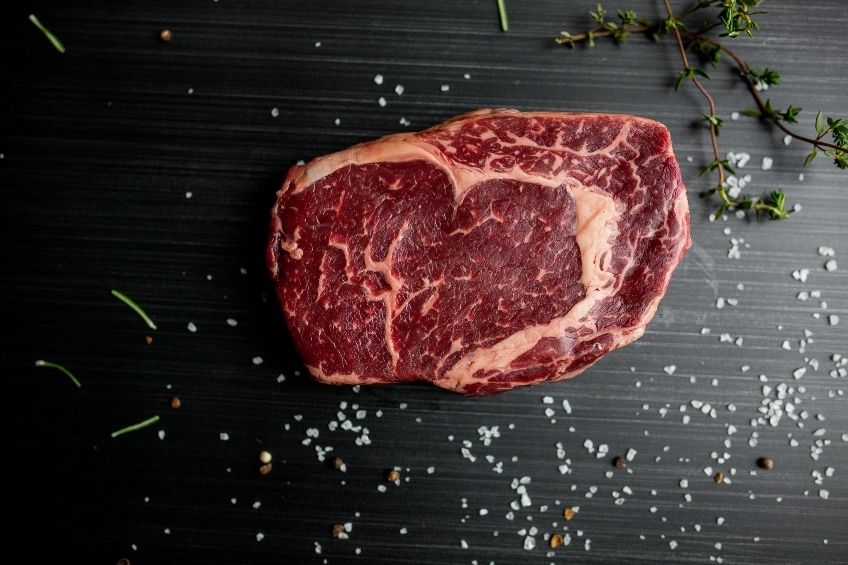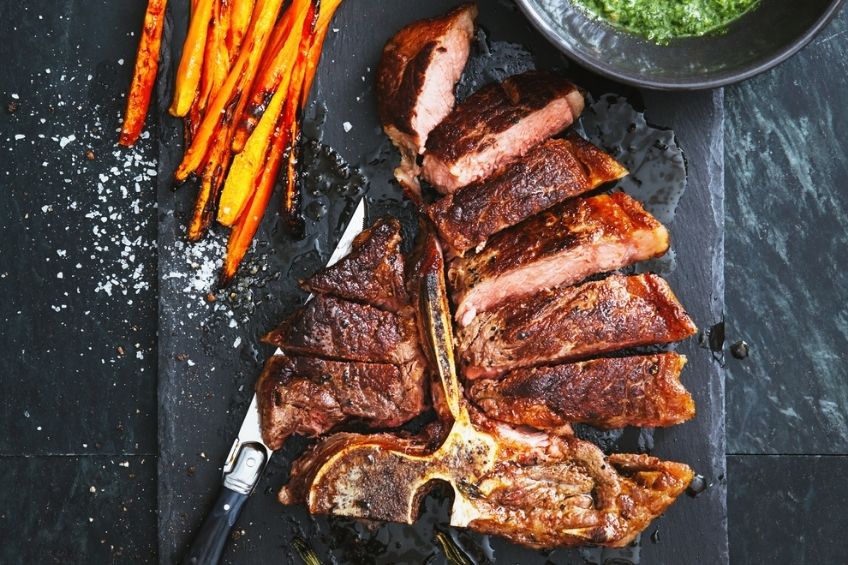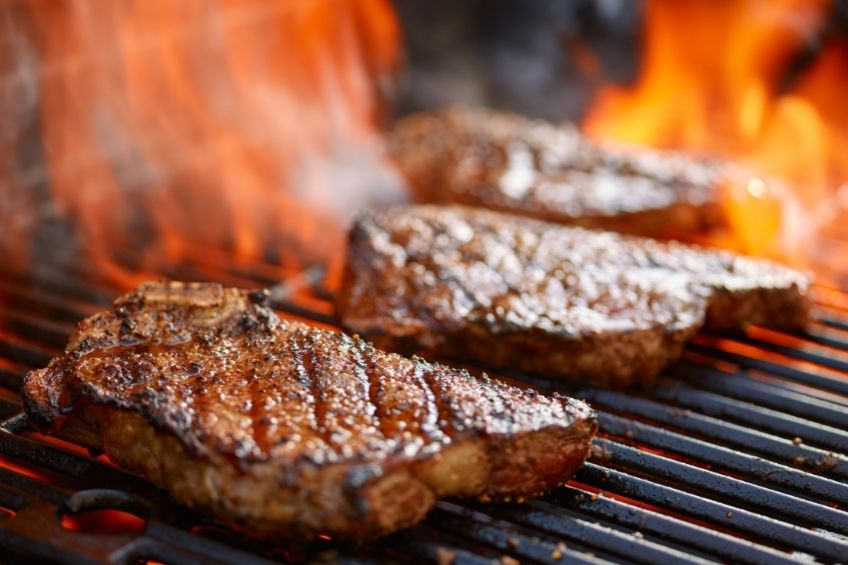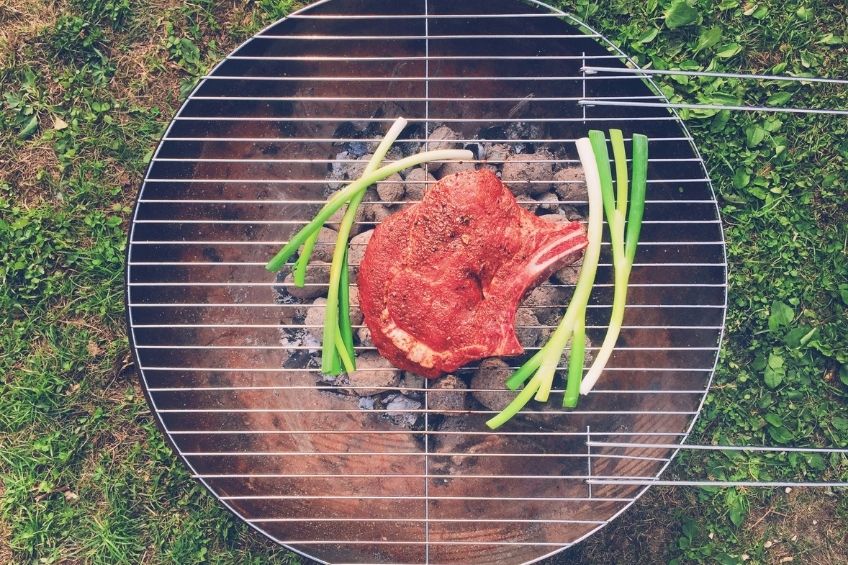The chefs and contestants on the hit show Fire Masters know it – when it comes to cooking steak, nothing beats the grill. It’s the combination of that slight char and simple seasoning that pushes us to cook outdoors – even when it isn’t summer grilling season.

If you’re going to brave cold temperatures for winter grilling or the high heat of the hottest months, it is a good idea to know how to make the most of a steak. What cut of meat should you buy? What grill temperature is just right? Does that lid stay open or closed? These sorts of questions are all that stand between you and a delicious, flame-kissed meal. For your perfect barbecued steak dinner, we’ve got you covered with this guide to mastering the grill. Luckily, we also believe practice makes perfect – that means steak should be on the menu all year round.
What cut should make the cut?
One of the best things about steak is that from the time it hits the grill to the time it lands on the plate isn’t too long – especially for those who prefer their steak rare. Steaks with nice marbling – those striations of white fat – cook up perfectly succulent. That is because fat means flavour. So when you’re looking at the butcher counter, opt for one of these:
Ribeye: Lots of marbling along with larger pockets of fat makes these steaks great for the grill. Preheat the grill with two burners on medium-high, and two that aren’t on at all – a two-zone fire. Sear the steaks for a few minutes per side to get those delightful sear marks, then move them to the “off “ side to finish cooking. Use a meat thermometer to ensure the perfect temperature of 125°F / 50°C. Rest for 10 minutes. The high heat will melt the fat and keep this steak super juicy.
Strip Loin: This cut, sometimes called a New York strip, is leaner than rib eye but still has plenty of beefy flavour. Season simply with salt and pepper, then sear them over direct high heat for 4 to 6 minutes per side. Rest before serving.

T-Bone: A classic cut, this is what we usually picture when we hear the word steak. Kind of like two steaks for the price of one, this cut is named after the T-shaped bone that divides the strip loin and a small portion of tenderloin. Cooking depends on the thickness. For T-Bones less than 1-inch thick, searing for a few minutes per side, then resting is enough. If the steak is over 1-inch thick start it slow, using indirect heat, on a grill set to 325°F / 165°C, until it reaches an internal temperature of 120°F / 148°C, then sear over high heat for a couple minutes per side for grill marks. Rest and serve topped with a knob of butter.
Flank Steak: This long, flat cut of beef is incredibly lean and an exception to the marbling rule. It should be cooked in a flash; too long on the grill can cause the meat to become tough. Think medium-rare, about 4 to 5 minutes per side over direct, high heat. A little help from an overnight marinade before hitting the grill is always a good idea. To serve, let the flank steak rest before slicing against the grain for tender strips of beef – ideal for tacos and sandwiches.
Skirt Steak: Similar to flank, skirt steak needs to be approached the same way. Marinate it before grilling to medium rare, rest and slice.
Filet Mignon: If you’re splurging and want an incredibly tender and thick steak, you can try a filet mignon, a cut of beef tenderloin. With only a little fat, this steak is subtle in flavour, but buttery in texture. It’s easy to overcook, so best for those who prefer their steaks medium or on the rarer side. Grill them using a similar technique to the Ribeye, and keep that meat thermometer handy.

Related: Best BBQ Side Dishes That are Just as Exciting as the Main Event
Heat it up
Cooking steaks is all about searing, so you want to get your grill hot, hot, hot.
Heat to at least 450°F before you put those steaks on to cook. This ensures the meat gets that delicious crust and stays tender on the inside.
When using infrared heat to cook your steak, side burners, reaching the right temperature takes less than a minute. You can go from craving a nice steak to searing in the juices for a restaurant-quality meal in mere minutes.
Open or closed?
If you’re puzzling over whether your steaks are best grilled with the lid open or not, wonder no more. The simple answer is: keep it open when high-temperature searing.
Closing the lid turns your grill into an oven – great for roasting meats, slowly cooking thicker cuts, and cooking chicken, but not as ideal when searing. A closed grill will start to cook the top of your steak, so you’ll miss that sizzle when you flip it.
An open lid gives you more control and lets you keep an eye on things. After all, there’s nothing worse than an overcooked steak.
Grilling 101
You’ve selected your cuts, heated your grill and are eager to eat. There are just a few steps to follow to make your steak truly great.
Start by generously salting your steak and letting it come to room temperature before grilling. About a half hour is all that’s needed to let the salt do its work. Use kosher or coarse salt will bring out the best flavor. Add a little freshly ground pepper or dehydrated garlic for even more flavour.
For some additional flavour, think of getting smoky. Wood chips, like mesquite or Applewood, enhance beef without much effort. With an integrated wood chip smoker tray – adding that woodsy, smoky flavour is about as easy as turning the grill on.
It’s all about timing, but even the pros can stumble over how long each side of the steak needs to reach the perfect temperature. A good rule of thumb is you need about two to three minutes per side to reach rare for a ¾-inch steak. Four minutes will be close to medium and another minute or two per side for a well-done steak. Your best bet is to take the guesswork out of the equation by using an instant-read meat thermometer.

When flipping the meat, it’s best to use tongs. Barbecue forks will pierce the meat, letting all those delicious juices escape. Finally – and this is the hard part! – let it rest for about 10 minutes before eating. This gives those juices time to redistribute and will keep your steak tender and tasty.
Is it done?
Cooking times may vary, but steak doneness temperatures are dependable.
For a rare steak, look for an internal temperature of 120ºF / 52°C. Medium-rare is around 135°F / 57°C. Medium steaks will read 140ºF / 60°C to 145ºF / 63°C and Medium-well between 150ºF / 66°C. A steak is well done at 160ºF / 71°C or more.
Photos courtesy of Getty Images.
Watch and stream all your favourite Food Network Canada shows through STACKTV, Corus Entertainment’s premium multi-channel streaming service, which is now available to Rogers Ignite TV and Ignite SmartStream customers, in addition to Amazon Prime Video subscribers.
